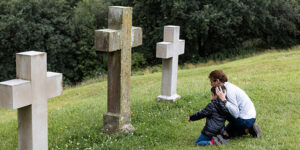Good Friday is the day when Christians worldwide pause to remember the crucifixion of our Saviour Jesus. Traditionally it’s a day of mourning. So how did it start? And why do we call it ‘good’?
The history of the day
In the first three centuries of the Church, Jesus’ death and resurrection were remembered together in a shorter celebration of Easter. The early Christians held one all-night vigil in the lead up to a service of communion at dawn on the Sunday.
Gradually, Easter began to take the form that it does today, spread out over a whole week—’Holy Week’—from Palm Sunday through to Maundy Thursday, Good Friday and then Easter Sunday. The idea of the week-long celebration is that Christians enter into the journey of Jesus, taking time to remember the various events of his final week.
The date of Easter changes because it is calculated in relationship to the cycles of the moon (following Passover, the Jewish festival during which Jesus died). Easter Day falls on the first Sunday after the full moon that follows March 20 (which used to be the date of the Equinox). So Good Friday always falls between March 20 and April 23. If your older children are interested in astronomy, they can read more about this complicated astronomical calculation.
Good Friday has always been a sombre day for Christians to reflect on the sacrificial death of their Lord. Most churches hold a reflective service, traditionally without the celebration of communion. The sombre mood is often expressed in churches being kept bare of any decorations and having music that is more subdued (in some traditions, without the organ).
The name of the day
In other cultures, the day is named differently. In German it is called ‘sorrowful’ Friday, and in Scandinavian languages (and Old English), ‘long Friday’, due to the length of traditional church services. In Romance languages, it is called ‘Holy Friday’ and in Greek it is called ‘the Holy and Great Friday’.
It is this final sense of the word that is carried by the English term ‘Good Friday’. According to the Oxford English Dictionary, ‘good’ in this context refers to ‘a day or season observed as holy by the church’.
So, the first thing we can tell our children is that the meaning of Good Friday is ‘Great’ or ‘Special’ Friday.
The goodness of the day
But there is more we can say. Since at least the late nineteenth century, Christian parents have been explaining to their children that Good Friday is good because that is the day when Jesus died to save us from our sins and give us eternal life. On that day, God turned humanity’s worst evil—executing the innocent Son of God—into our greatest good—salvation for all who believe in him.
This was possible because Jesus chose to go to the cross; he willingly took the penalty for our sins, enduring condemnation and separation from God so that we don’t have to. Yes, Jesus was killed. But he also ‘laid down his life’ for us. He said, ‘I have authority to lay it down and authority to take it up again’ (John 10:18). As we explain Jesus’ death to our children, we can reassure them that Jesus wasn’t just a powerless victim. We can remind them of what Jesus said to his disciples when they wanted to fight against his arrest:
‘Do you think I cannot call on my Father, and he will at once put at my disposal more than twelve legions of angels? But how then would the Scriptures be fulfilled that say it must happen in this way?’ (Matthew 26:53–4)
This Easter, let’s tell our children that Good Friday is a sad day. It is right to mourn the suffering and death that Jesus faced. But it is also a good day, because it marks the day when Jesus set us free from our sins by his blood and opened up the gates of heaven to all who believe in him.
This article originally appeared at Growing Faith, a Christian online magazine for parents. Find out more about Growing Faith and subscribe to our monthly e-newsletter here.
References
‘Who, What, Why: Why is Good Friday called Good Friday?’ BBC Magazine.
‘Good Friday’, Britannica.
‘Passiontide and Holy Week’, Church of England.
‘Calculate the Date of Easter Sunday’, Astronomical Society of South Australia.



